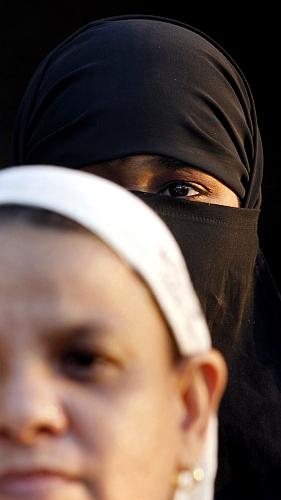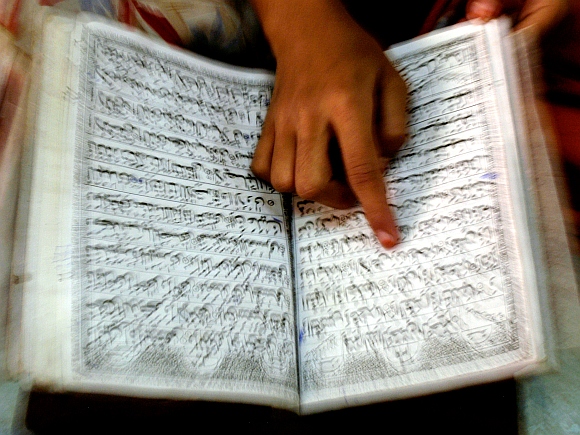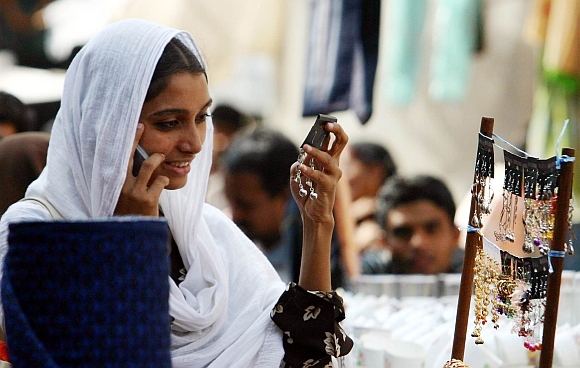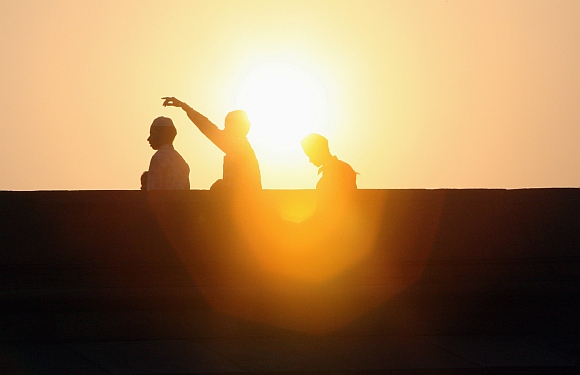Photographs: Arko Datta/Reuters
A recent study shows a higher minority representation in assemblies has a correlation with progress for all on key social indicators, says Rupa Subramanya
In 2011, Samajwadi Party leader Mulayam Singh Yadav expressed concern over the low representation of Muslims in the Lok Sabha and assemblies. He suggested quotas to rectify this.
Apart from an old provision for Anglo-Indian representation, there's no constitutional provision on quotas for minorities or backward castes in the Lok Sabha or the state Assemblies.
While Muslims comprise about 14 per cent of the population, they occupy much less in legislatures. For instance, after the 2009 Lok Sabha elections, there were only 28 Muslim members or a little more than five per cent of the House.
In Gujarat, of 182 directly elected members of Legislateive Assembly (one more is nominated) after last year's elections, there were only two Muslims -- little over one per cent of the total, as compared to about seven per cent of the total population.
Both winners were from the Congress, which fielded just seven Muslims in all. The ruling Bharatiya Janata Party fielded none; nor did the challenger, the Gujarat Parivartan Party.
...
The merits of quotas are debated
Image: A Muslim girl reads the Koran inside a Madrasa in MumbaiPhotographs: Adeel Halim/Reuters
The merits of quotas are debated. Supporters say these would give a much-needed boost to historically disadvantaged communities, which lag in education, health and other social indicators. Critics say quotas needlessly punish members of the majority community for social ills which are centuries old.
In this context, it would be interesting to check if more representation of minorities or backward castes in legislatures would actually improve outcomes for the communities they represent or for society at large.
An important first step in answering this comes from research by a group of economics professors in different universities in Europe and the US -- Sonia Bhalotra, Guilhem Cassan, Irma Clots-Figueras and Lakshmi Iyer. They amassed data on the religious identity of candidates for all state assemblies from 1977 to 1998.
They correlated this with data on education and health outcomes at the district level for the same time period, being careful to map each constituency to the district within which it fell. Data limitations didn't allow them to extend the study to more recent elections.
They wanted to study whether an increase in Muslim representation was of benefit to the Muslim community, and non-Muslims as well. Their results suggest an increase in Muslim representation is good for everyone.
To be more precise, a one percentage point increase in Muslim representation led to a 0.148 percentage point decline in infant mortality and a 0.09 per cent a year increase in primary schooling. In fact, their results showed Muslims themselves benefited somewhat less than non-Muslims in the education and health outcomes.
...
Reasons, debate
Image: A woman looks at jewellery at a shop in BhopalPhotographs: Raj Patidar/Reuters
Iyer, a professor at HarvardBusinessSchool, told Business Standard there were several likely possibilities to explain these results. The first is that as Muslims are, on average, poorer than non-Muslims, it would make sense that they'd have a higher preference for public goods such as education and health. So, if elected, a Muslim legislator will press more for these public goods than a non-Muslim.
But why do these benefits spill over to everyone and not stay confined to the Muslim community? Iyer suggests as Muslims are more likely to live in densely populated urban areas, it would be difficult in both practical and political terms to target the benefits for only Muslims.
After all, a public school or hospital is open to everyone, not just to the members of a local MLA's community who might have pushed to get that school or hospital in the first place.
There could also be a strategic political element at work. Since Muslims are a numerical minority in most constituencies, successful Muslim candidates will typically have to rely on the support of at least some non-Muslim voters and it's in their interest that these voters also benefit from increased access to public goods.
...
Reasons, debate
Image: Men are silhouetted against the morning sun before offering prayersat the Jama Masjid mosque on the occasion of Eid al-Fitr in the old quarters of DelhiPhotographs: Vijay Mathur/Reuters
This would be especially true if those voters came from another disadvantaged community such as backward castes, who might also have a preference for more public spending. What the researchers cannot explain is why Muslims themselves appear to benefit somewhat less.
The issue is whether these research findings provide a persuasive argument in favour of creating quotas for Muslims (or other minorities) in state assemblies. While the inference in favour of quotas might be appealing, Iyer herself is circumspect, and suggests there are at least two reasons why quotas might not deliver the improved outcomes the research finds.
The first is that a quota might change the pool of would-be candidates entering elections. A weaker candidate who gets in only because of a quota might not be as committed to improving outcomes for his/her constituents as a candidate who had to fight and win a competitive election.
Second, and related, if quotas make elections less competitive, there's less incentive for Muslim candidates to try to win over voters on the fence by delivering on better public goods.
However, this research does support the idea that it would be good if more minority candidates would stand for elections and also if major political parties were to offer them a larger number of tickets. Good for not only a pluralistic democracy but for development outcomes.a






article